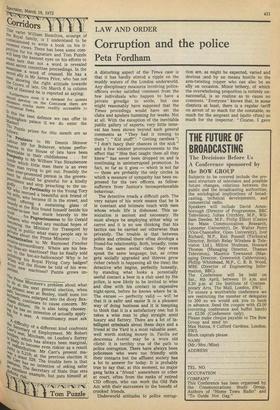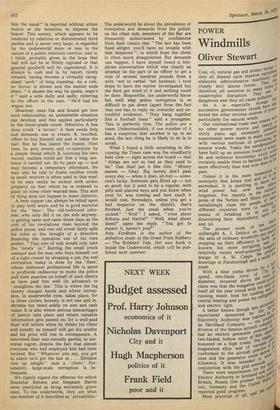LAW AND ORDER
Corruption and the police
Feta Fordham
A disturbing aspect of the Times case is that it has hardly stirred a ripple on the muddy waters of the London underworld. Any disciplinary measures involving policeofficers evoke satisfied comment from the few individuals who happen to have a private groudge to settle, but one might reasonably have supposed that the Times procedings would have set the clubs and spielers humming for weeks. Not at all. With the exception of the inevitable public gallery of experts, very little interest has been shown beyond such general comments as "They had it coming to them "; "Kid stuff!": " Getting careless "; "I don't fancy their chances in the nick" and a few sinister pronouncements to the effect that "Him that taught them all they knew" has never been dropped on and is continuing in uninterrupted promotion. In fact, so far as it goes — which is not far — these are probably the only circles in which a measure of sympathy has been expressed for the two officers, as fellowsufferers from Justice's incomprehensible behaviour.
The detective treads a difficult path. The very nature of his work means that he is in constant and intimate touch with men whose whole life is dishonest. This association is ancient and necessary. He must always be employing either whip or carrot and it is no use thinking that his tactics can be carried out otherwise than privately. The trouble is that between police and criminal there often develops a friend-foe relationship. Both, broadly, come from the same social class: they even speak the same language; but, as crime gets socially upgraded and thieves grow richer (which is happening all the time) the detective who begins, perfectly honestly, by standing what looks a potentially useful contact a beer in a club used by the police, is now likely to be invited to wine and dine with his contact in expensive night-spots, before he knows where he is The excuse — perfectly valid — will be that it is safer and easier It is a pleasant way of doing business and it is tempting to think that it is a satisfactory one; but it takes a wise man to play straight amid luxury and flattery. There are a lot of intelligent criminals about these days and a friend at the Yard is a most valuable asset, well worth sinking money in. Facilis est clescensus Averni may be a worn old cliché: it is terribly true of the path to police corruption. There have always been policemen who were too friendly with their contacts but the affluent society has a lot to answer for today. It is probably true to say that, at this moment, no major gang lacks a ' friend ' somewhere or other at court, often from the ranks of retired CID officers, who can work the Old Pals Act with their successors to the benefit of crooked friends.
Underworld attitudes to police corrup tion are, as might be expected, varied and devious ;and by no means hostile to the arm-twisting copper who can also be an ally on occasion. Minor bribery, of which the overwhelming proportion is entirely unsuccessful, is so routine as to cause no comment. ' Everyone ' knows that, in some districts at least, there is a regular tariff on arrest of so much for the constable, so much for the sergeant and (quite often) so much for the inspector. "Course, I gave him the usual" is reported without either malice or the intention to impress the hearer. This money, which appears to be tendered by relatives or disinterested third parties and is never very large, is regarded by the underworld more or less in the nature of a public relations exercise ;and is, I think, probably given in the hope that bail will not be so firmly opposed or that general goodwill will be engendered. It is always in cash and is, by report, rarely refused, having become a virtually recognised 'perk' of long standing. As a rule, no favour is shown and the matter ends there. "A shame the way he spoke, wasn't it " said a wife dully and sadly, referring to the officer in the case. " He'd had his wages too.
However, once fox and hound get into such relationship, an undesirable situation can develop; and this applies particularly to the lower-grade crook. Detective A has done crook 'a favour.' A then needs help and demands one in return. B. terrified, offers to buy himself out and A takes the bait. But he has learnt the lesson. Next time, he gets money and co-operation by a simple threat which B, knowing his own record, realises could get him a long sentence if carried out. So he pays up — and may become a temporary informant. He may also be told to frame another crook (a small receiver is often used in this way) or he may really be nicked with stolen property on him which he is ordered to plant on some other wanted man. This sort of thing does not happen in many districts.
A bent copper can always be relied upon to play both ways; and he is good material for the 'fixer.' The old-fashioned informer, who only did it on the side anyway, is getting rarer and rarer these days as the cost of his revelations rises beyond the police purse; and one old crook fairly split his sides at the thought of a detective financing the operation out of his own pocket. "That sort of talk would only take the ' briefs ' in." Barring the small crook manqué and the man who buys himself out of a tight corner by shopping a pal, the real corruption today is done by the 'fixer,' whose dishonest professional life is spent in profitable endeavour to make the police pull their punches on behalf of such clients as have paid him well (in advance!) to straighten the law.' This is where the big money changes hands and where corrup tion, in underworld eyes, takes place; for in these circles, honesty is not one and indivisibe but rated solely on size and cash value. It is also where serious miscarriages of justice take place and where valuable information gets passed on; for a well-paid fixer will inform when he thinks his client will benefit: he himself will get his credits and his price will rise in consequence. A renowned fixer was recently gaoled, to uni versal regret, despite the fact that almost everyone who had employed him had been twisted. But "Whatever you say, you got to admit he'd got the law in . . . Division tied up alright " said a client.' Fortunately, large-scale corruption is infrequent.
We rightly regard the offences for which Inspector Robson and Sergeant Harris were convicted as being extremely grave ones. To the underworld, they are what one member of it described as piccadillies.' The underworld lie about the prevalence of corruption and demands from the police: on the other side, members of the Bar are frequently embarrassed by confidences from their clients that "The law has been fixed alright: you'll have no trouble with that Inspector "; in which hope the client. is often much disappointed. But demands can happen. I have myself heard a telephone conversation which was clearly an attempt on the part of an officer to get a sum of several hundred pounds from a wife 'not to verbal 'her husband. I took steps to have the matter investigated but the fixer got wind of it and nothing could hp done. Meanwhile, the underworld know full well why police corruption is so difficult to pin down (apart from the fact that one has to reply on cowardly and untruthful evidence). "They hang together like a football team" said a youngster. This is perfectly true. The police are a team. Understandably, if one member of it has a suspicion that another is up to no good, the last thing he is likely to do is to sneak.
What I found a little surprising in discussing the Times case was the sieadfastly held view — right across the board — that " things are not so bad as they used to be." One thief put it like this: "Money passes — Okay. Big money don't pass every day — when it does, uh-huh — someone's lucky. Someone gets fitted up — not so good; but it used to be a regular, with jelly and planted keys and you knew when your lot was coming and how much it would cost. Nowadays, unless you get a bad inspector on the district, that's finished. Just the usual when you're nicked." "Well " I asked, "what about Robson and Harris?" "Well, what about them?" came •the reply. "You got to expect it, haven't you?"
Peta Fordham is the author of the definitive study of the Great Train Robbery — The Robbers' Tale Her new book is Inside the Underworld, which will be published next summer.











































 Previous page
Previous page